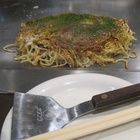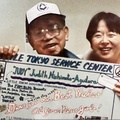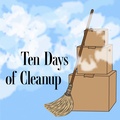Deep’s Butcher Shop in East Harlem is nothing like the ones I’ve seen in other parts of New York City. Yes, there’s a large refrigerated case of meats, but the walls, for the most part, have cases of books. And not cookbooks, but books of poetry and classics, ones that I attempted to read in translation in high school in Japan. I never was good in literature.
Through two small speakers mounted on the ceiling sounds Bob Marley. I know Bob Marley through my ex-boyfriend, Makoto, who took me to various reggae bars throughout Hiroshima. In between a couple of bookcases are two framed poems. I can’t really understand them, but some lines jump out at me: “My soul has grown deep like the rivers.” And another one—“Does it stink like rotten meat?” Should that be something on display in a butcher shop?
At first I think that I’m the only person in the small space, but then I sense movement behind the meat case. It’s a man probably a little older than me, head shaven and dark-skinned.
“Hallo,” I say.
“Yeah.” He steps to the side. He’s wearing a white apron that is stained in blood.
“Ah, this is a butcher shop,” I almost say it like a question and feel immediately embarrassed.
“That’s what it says on the sign outside, right?” The man sighs as if he’s already lost patience with me.
I inspect his meat case and see some sliced pork belly—marbled perfectly with not too much fat.
“Two pounds, pork belly,” I tell him.
As he wraps my order, I return back to the poems.
“You know Langston Hughes? He used to live in this neighborhood.” The butcher’s voice regains some energy.
I shake my head, and I realize that I have given him the wrong answer.
“I am from Japan.” I return back to the meat case, and he flinches a little, as if I told him something painful.
“What are you making?” He tapes close the paper wrapper holding my pork belly.
“Okonomiyaki.”
“Oki-what?”
“From Hiroshima.” I then give a quick description of okonomiyaki—a tasty thin pancake with pork belly, cabbage, and noodles with a wonderful thick sauce.
“I didn’t think anything good came out of Hiroshima. Isn’t it radioactive?”
“No, no,” I say, trying not to think of the old Andersen bakery building that was being torn down in the Hondori shopping district in Hiroshima. It had been a former bank that had survived the atomic bombing. While the owners said that it was too hard to make it earthquake proof, I wondered if there was something lingering in that wartime building. “You never go to Japan?”
Now he shakes his head.
“Then you do not know Japan.”
“I know enough. I know that I’d never want to step foot in it.” His harsh words burn. “My father was stationed there. In Yokosuka.”
“That is a base. You cannot judge Japan by Yokosuka. Hiroshima is wonderful.” I struggle with my English vocabulary. We had a lot of gaijin come by Aka Okonomiyaki in Hiroshima, so at least I’ve had that practice.
“What’s so wonderful about it? I’ve heard all about the Peace Park. But what else?”
I tell him about the ocean, the rivers all through our city. And the Hiroshima Carp baseball team, which almost took the national championship. “And we have a castle,” I tell him.
“I thought that the city was destroyed. Flattened. You know, the atomic bomb.”
“Everything is reno—renovated.”
“So the castle’s not really authentic. Your Hiroshima’s fake.”
I know that I should hold my tongue. But to hear an American say that my hometown was artificial was too much. “That is not nice.”
“Look, this is America. Everyone can have an opinion. And I have mine.”
“Hello, hello.” A dark-skinned black man stands behind him. Judging from the way he addresses the butcher, he is a regular customer. In the heat of our discussion, I didn’t even notice anyone entering the shop. “What did I walk into? A lover’s spat?”
“Don’t be stupid,” the butcher says to him. And then to me, he tells me how much I owe him. I go deep into my messenger bag and have a hard time finding my wallet.
The butcher sighs again and tells the other customer, “I’ll get your order, Rodney.”
He disappears into the back and Rodney turns to me. “Hey, don’t take Tom serious, okay?” He pronounces “Tom” like “Tam.” “He’s a bit rough around the edges.”
He sure was.
“He’s got the best meat in Manhattan. And I know. I’ve run my restaurant in the Bronx for twenty years.”
“He is very mean.”
“Where you from?” Obviously Rodney figured out that I wasn’t from America.
“Japan.”
“Well, we have a saying here—waking up on the wrong side of the bed.”
I struggle to visualize that image.
“It means that for whatever reason, you don’t feel right. You’re in a bad mood, but you don’t know why.”
“Okay,” I say.
“Tom just wakes up on the wrong side of the bed everyday.”
“He does not like Japanese people.”
“Where did you get that?”
“He told me that his father was a soldier in Japan. I do not think that it was a good experience.”
“You got that out of Tom?”
I nod.
“Then you’re a miracle worker. He doesn’t say anything about himself to nobody.”
Tom then returns back with a crate, which he places in Rodney’s hands. “Thanks, man.”
“No, thank you.” Rodney then whispers in my ear. “Don’t take it personal. Remember, it’s all about the meat.” With that, Rodney and his crate are gone.
I struggle with the American money. I’m not sure what denominations are what and Tom, sighing again, takes a few bills from my hands. He goes behind the counter and brings back some change. “You better hurry up and catch on, Hiroshima girl. This city’s going to eat you alive.”
My face turns red as I stuff my package of pork belly into my bag. Rude! I didn’t care how good his meat is, this kind of treatment was so unacceptable. I was tired and sore. I never was the type of girl that could take rude behavior from anybody. Maybe that’s why I never got along with my uncle.
As I made my way to the door, Tom turned up the Bob Marley music, as if the volume could erase my presence.
I walk a few blocks, not even paying attention to where I am going. I find myself in front of a Starbucks and go in to connect to the Internet. I find the Yelp listing on my cell phone. I try to sign up to leave a review. It takes me a few tries, but I’m finally on.
I find the page for Deep’s Butcher Shop in New York City.
I tap one star and then type in one word, my simple review: “Rotten.”
© 2016 Naomi Hirahara





